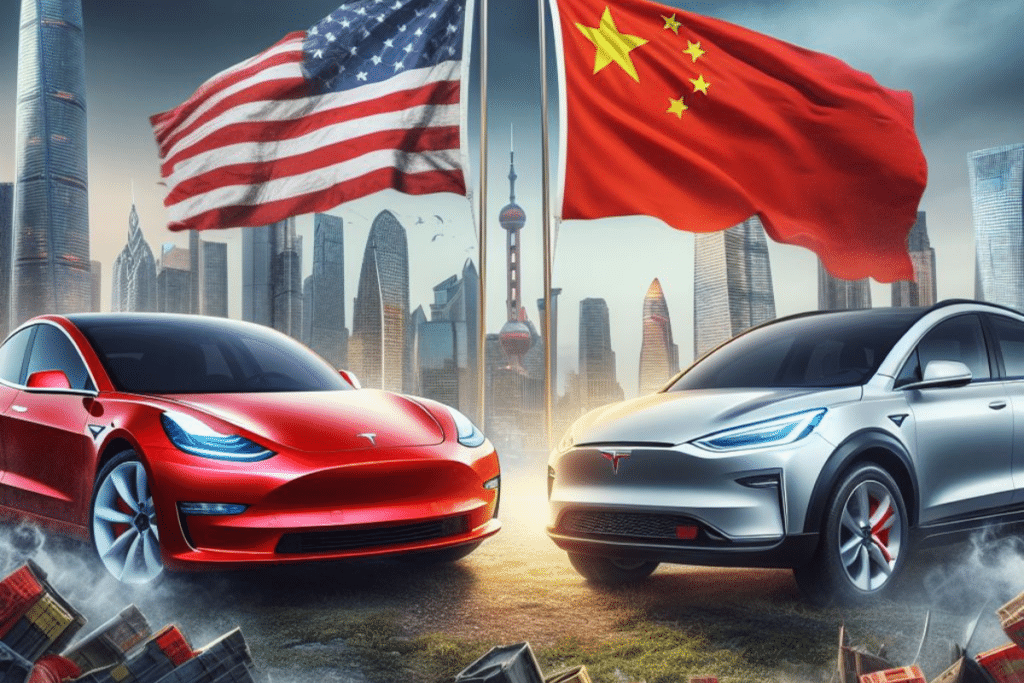China vs USA: Beijing takes control of the electric vehicle market, Tesla overshadowed!
As China takes a decisive lead in the global race for affordable electric vehicles, American automakers such as Tesla are now compelled to respond quickly before losing their grip on the domestic market.

Growing Rivalry on the Electric Vehicle Front
Long comfortable in their dominant position, American automotive giants now face a formidable challenge coming from China. The rapid rise of Chinese manufacturers of low-cost electric cars, poised to dethrone Tesla as the world’s leading producer, has sounded the alarm for companies such as General Motors and Ford.
Yet, in 2011, Elon Musk was still openly mocking the capacity of BYD, the Chinese manufacturer backed by Warren Buffett, to produce electric vehicles of any significance. However, this company has rapidly closed the gap. Today, one-third of the electric vehicles sold worldwide come off its assembly lines, compared to only 15% in 2020.
For too long, American manufacturers underestimated their Chinese counterparts. Now, warnings are coming from all sides. During a conference with investors in January, Musk himself rang the alarm bell, warning that Chinese cars would “almost destroy” American manufacturers if they were allowed to penetrate the US market. GM and Ford also recognize the need to accelerate to offer affordable models before China definitively takes the lead.
While Tesla and the major names focus on a few high-end models, Chinese brands are already offering a wide range of prices, from entry-level city cars to luxury sports cars, including family SUVs. And while the Americans strive to conquer their own market, Beijing is now targeting exports, including to the United States.
“It’s time to rethink the preconceived notions about the inferior quality of Chinese manufacturers,” analyzes Tu Le, a renowned expert on the Chinese market. “Currently, facing this offensive, traditional manufacturers simply do not have competitive products to counter.“
American Manufacturers Struggle to Stay Competitive
An unprecedented seismic shift is shaking the established order of the global automotive industry, comparable to Japan’s irruption into the market in the 1970s. The stakes are enormous: an industry worth $104 billion that employs 3 million people in the United States.
“It’s a global upheaval that American manufacturers simply did not pay enough attention to,” laments Tu Le, a reputable expert.
Although electric vehicle sales have surpassed the one million unit mark in the United States, manufacturers still struggle to attract beyond the first-time buyers with models often priced $10,000 higher than their thermal equivalents.
In the face of this challenge, Ford and GM are now focusing all their efforts on developing affordable mainstream models. For its part, Tesla has been promising a $25,000 model for years, but has so far been unsuccessful in this goal.
In the meantime, China is flooding the market with a plethora of offerings, covering all price segments, from $10,000 city cars to premium floating SUVs priced up to $100,000.
Expansion towards Europe and the United States
Taking advantage of favorable labor costs, China is also betting on the mastery of the entire supply chain, an industrial ecosystem methodically structured by the government for over a decade. Many Chinese companies, like BYD which supplies the batteries for Tesla, thus sell their components to American brands.
However, despite this massive offensive on all fronts, there are still numerous obstacles for China. The domestic market is experiencing a slowdown and production overcapacities compel the need to find new external markets.
Hence the strategic interest in breaking into the European and American markets. While access to the Old Continent seems relatively easier, with a factory project in Hungary, the US market remains solidly protected by significant customs and regulatory barriers.
To circumvent these hurdles, Chinese brands are now considering setting up in Mexico, at the doorstep of the North American market. But the road remains strewn with regulatory, commercial, and even national security considerations.
A high-intensity tug-of-war thus looms between the imperatives of competitiveness for consumers and those of preserving jobs and strategic interests of national industries. The very future of the global automobile industry could well be at stake.
“””
Maximize your Cointribune experience with our "Read to Earn" program! For every article you read, earn points and access exclusive rewards. Sign up now and start earning benefits.
Passionné par le Bitcoin, j'aime explorer les méandres de la blockchain et des cryptos et je partage mes découvertes avec la communauté. Mon rêve est de vivre dans un monde où la vie privée et la liberté financière sont garanties pour tous, et je crois fermement que Bitcoin est l'outil qui peut rendre cela possible.
The views, thoughts, and opinions expressed in this article belong solely to the author, and should not be taken as investment advice. Do your own research before taking any investment decisions.